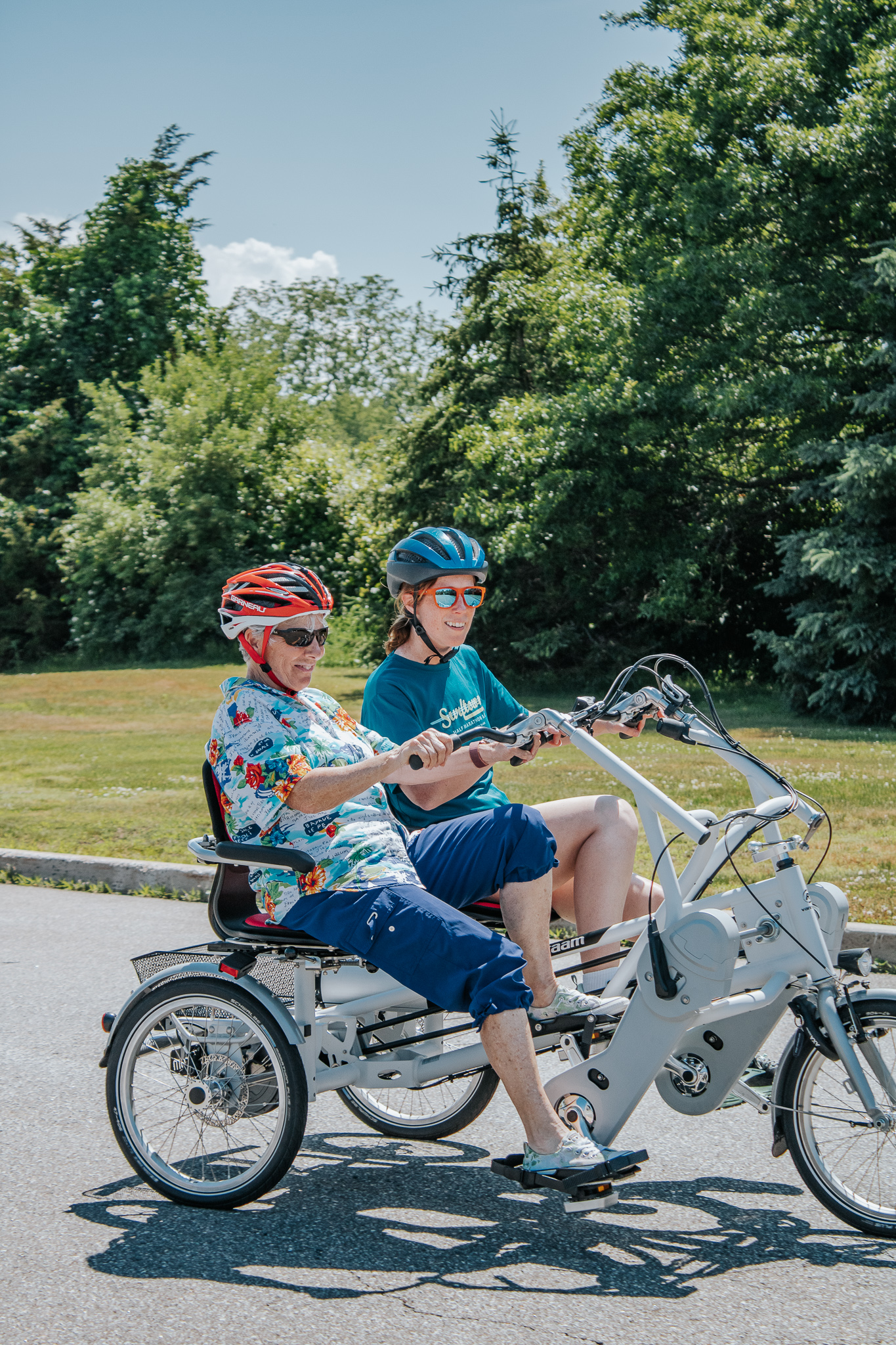Project Background
Assisted living (AL) facilities provide a variety of supportive health services to older adults in an effort to maximize resident wellbeing. Unfortunately, a global shortage of frontline healthcare workers has contributed to staffing shortages and overworked employees in many of these facilities. The resulting stress and burnout in employees can be detrimental to their health and wellbeing. It also negatively affects interactions with the residents in their care. Some facilities offer employee wellness programs, but staff are frequently required to access services off-site and outside of their typical workday. This limits their accessibility for many.
This project will introduce a program that aims to simultaneously promote wellbeing in AL residents and staff through outdoor adaptive biking experiences. Participants in the program (residents and staff) will engage in a weekly adaptive bike ride over the course of eight consecutive weeks. Each ride will last 20-30 minutes and occur in the neighborhood surrounding the AL facility. A side-by-side tandem bike with electronic-assist will be used to enable an employee and resident to complete their bike ride together. Employees will schedule their ride during their work shift, and resident rides will be incorporated into recreational therapy programming provided at the facility. Each week, a new wellness theme will be introduced as part of the ride experience. Participants will receive conversation prompts and reflection questions aligned with that week's theme. Wellbeing assessments and an overall program evaluation will be used to evaluate the efficacy of the intervention for both residents and staff.
Student Role
The student's primary role in this project will be coordinating the biking intervention. This will occur on-site at the partnering agency (a local assisted living facility). During the first week of the SPUR program, the student will be oriented to the study, complete necessary trainings, and assist in obtaining baseline data for all study participants (staff and residents). The next eight weeks will be devoted to implementing the adaptive biking program. The student will be responsible for scheduling participants for rides, setting up the necessary equipment (bike, helmets, water), maintaining safety and infection control protocols (checking outdoor weather conditions, cleaning the equipment), completing participation logs, and collecting pre-post ride assessment data. The student will work collaboratively with the University mentor and the study investigator employed at the facility. They will be expected to attend regular research team meetings. The student should expect extensive interactions with staff and residents at the Assisted Living facility. Other duties will include scoring standardized assessments, and managing data in an electronic database. The final week of the SPUR program will involve post-study data collection and preliminary data analysis.
Student Learning Outcomes and Benefits
This undergraduate research opportunity will provide a student with extensive experience in human subjects research and program coordination. Specifically, the student will:
- Expand their knowledge of research processes and procedures
- Build confidence in engaging as a professional in a healthcare environment
- Learn about a variety of wellbeing assessments appropriate for use with older adults and/or healthcare workers.
- Gain skill in scoring standardized assessments
- Develop organizational skills through project coordination and scheduling of participants
- Enhance professional communication skills with diverse individuals (health care workers and assisted living residents)
- Demonstrate competence in using and maintaining adaptive biking equipment
- Increase familiarity with of the scope of services and operations common to Assisted Living facilities
- Observe research team meetings
- Complete basic data management tasks
These experiences will be most beneficial for individuals interested in working and/or conducting research in the healthcare environment - particularly with older adults. However, many of these learning outcomes have broad applicability to other settings and professional positions.

Rhonda Nelson
My research focuses on the use of recreation-based interventions for health promotion and rehabilitation. I am the founder and director of the Recreational Therapy Research and Training Lab that aims to bring together faculty, students, clinicians/practitioners, and clients/patients on research projects. As such, most of my research is conducted in collaboration with community partners/local healthcare agencies.
I am an experienced research mentor who enjoys working with undergraduate students. My aim is to support the student in their professional and personal development through diverse learning experiences. Students are viewed as a valued contributor and member of the research team. As a mentor, I aim to challenge students to learn new skills while ensuring adequate instruction and supports are in place for success.
For this project, students will meet with me weekly to review their responsibilities and report on progress. This is also focused time for the student to ask questions and seek guidance, as needed. The student will be encouraged to reflect critically on their experiences and apply learning to other contexts. Additional meetings and communications are always available, as needed.
The student assigned to this project will also meet with other members of the research team and benefit from interactions with project staff employed at the assisted living facility. While this ensures adequate supervision and support, the student will be challenged to function as independently as possible.
